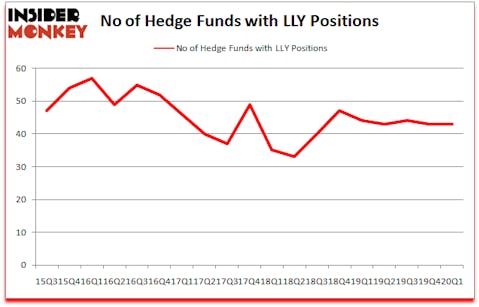At the end of February we announced the arrival of the first US recession since 2009 and we predicted that the market will decline by at least 20% in (see why hell is coming). In these volatile markets we scrutinize hedge fund filings to get a reading on which direction each stock might be going. In this article, we will take a closer look at hedge fund sentiment towards Eli Lilly and Company (NYSE:LLY) at the end of the first quarter and determine whether the smart money was really smart about this stock.
Hedge fund interest in Eli Lilly and Company (NYSE:LLY) shares was flat at the end of last quarter. This is usually a negative indicator. At the end of this article we will also compare LLY to other stocks including The Unilever Group (NYSE:UL), SAP SE (NYSE:SAP), and NIKE, Inc. (NYSE:NKE) to get a better sense of its popularity.
Video: Watch our video about the top 5 most popular hedge fund stocks.
Why do we pay any attention at all to hedge fund sentiment? Our research has shown that a select group of hedge fund holdings outperformed the S&P 500 ETFs by 58 percentage points since March 2017 (see the details here). We were also able to identify in advance a select group of hedge fund holdings that’ll significantly underperform the market. We have been tracking and sharing the list of these stocks since February 2017 and they lost 36% through May 18th. That’s why we believe hedge fund sentiment is an extremely useful indicator that investors should pay attention to.

Phill Gross of Adage Capital Management
At Insider Monkey we scour multiple sources to uncover the next great investment idea. For example, this trader claims to score lucrative profits by utilizing a “weekend trading strategy”, so we look into his strategy’s picks. Federal Reserve has been creating trillions of dollars electronically to keep the interest rates near zero. We believe this will lead to inflation and boost gold prices. So, we are checking out this junior gold mining stock. We read hedge fund investor letters and listen to stock pitches at hedge fund conferences. We recently recommended several stocks partly inspired by legendary Bill Miller’s investor letter. Our best call in 2020 was shorting the market when the S&P 500 was trading at 3150 in February after realizing the coronavirus pandemic’s significance before most investors. Now let’s analyze the latest hedge fund action encompassing Eli Lilly and Company (NYSE:LLY).
How have hedgies been trading Eli Lilly and Company (NYSE:LLY)?
At Q1’s end, a total of 43 of the hedge funds tracked by Insider Monkey were long this stock, a change of 0% from the fourth quarter of 2019. Below, you can check out the change in hedge fund sentiment towards LLY over the last 18 quarters. So, let’s check out which hedge funds were among the top holders of the stock and which hedge funds were making big moves.

The largest stake in Eli Lilly and Company (NYSE:LLY) was held by Fisher Asset Management, which reported holding $601.3 million worth of stock at the end of September. It was followed by AQR Capital Management with a $198.6 million position. Other investors bullish on the company included Two Sigma Advisors, Adage Capital Management, and Citadel Investment Group. In terms of the portfolio weights assigned to each position Sustainable Insight Capital Management allocated the biggest weight to Eli Lilly and Company (NYSE:LLY), around 4.87% of its 13F portfolio. Huber Capital Management is also relatively very bullish on the stock, earmarking 3.55 percent of its 13F equity portfolio to LLY.
Seeing as Eli Lilly and Company (NYSE:LLY) has faced declining sentiment from the entirety of the hedge funds we track, we can see that there is a sect of money managers who sold off their positions entirely in the first quarter. At the top of the heap, Steve Cohen’s Point72 Asset Management said goodbye to the biggest investment of all the hedgies tracked by Insider Monkey, comprising about $76.4 million in stock, and Dmitry Balyasny’s Balyasny Asset Management was right behind this move, as the fund said goodbye to about $51.3 million worth. These moves are interesting, as aggregate hedge fund interest stayed the same (this is a bearish signal in our experience).
Let’s go over hedge fund activity in other stocks – not necessarily in the same industry as Eli Lilly and Company (NYSE:LLY) but similarly valued. These stocks are The Unilever Group (NYSE:UL), SAP SE (NYSE:SAP), NIKE, Inc. (NYSE:NKE), and salesforce.com, inc. (NYSE:CRM). This group of stocks’ market caps are similar to LLY’s market cap.
| Ticker | No of HFs with positions | Total Value of HF Positions (x1000) | Change in HF Position |
|---|---|---|---|
| UL | 13 | 207786 | -4 |
| SAP | 15 | 1386317 | -1 |
| NKE | 80 | 2172472 | -1 |
| CRM | 117 | 7122915 | 5 |
| Average | 56.25 | 2722373 | -0.25 |
View table here if you experience formatting issues.
As you can see these stocks had an average of 56.25 hedge funds with bullish positions and the average amount invested in these stocks was $2722 million. That figure was $1323 million in LLY’s case. salesforce.com, inc. (NYSE:CRM) is the most popular stock in this table. On the other hand The Unilever Group (NYSE:UL) is the least popular one with only 13 bullish hedge fund positions. Eli Lilly and Company (NYSE:LLY) is not the least popular stock in this group but hedge fund interest is still below average. This is a slightly negative signal and we’d rather spend our time researching stocks that hedge funds are piling on. Our calculations showed that top 10 most popular stocks among hedge funds returned 41.4% in 2019 and outperformed the S&P 500 ETF (SPY) by 10.1 percentage points. These stocks gained 12.3% in 2020 through June 30th and surpassed the market by 15.5 percentage points. Unfortunately LLY wasn’t nearly as popular as these 10 stocks (hedge fund sentiment was quite bearish); LLY investors were disappointed as the stock returned 18.9% during the second quarter and underperformed the market. If you are interested in investing in large cap stocks with huge upside potential, you should check out the top 10 most popular stocks among hedge funds as most of these stocks already outperformed the market in 2020.
Follow Eli Lilly & Co (NYSE:LLY)
Follow Eli Lilly & Co (NYSE:LLY)
Receive real-time insider trading and news alerts
Disclosure: None. This article was originally published at Insider Monkey.




